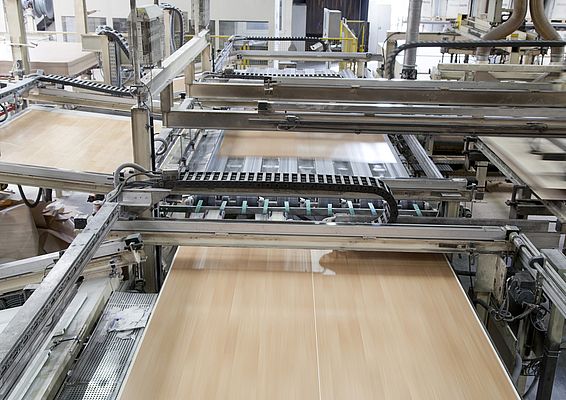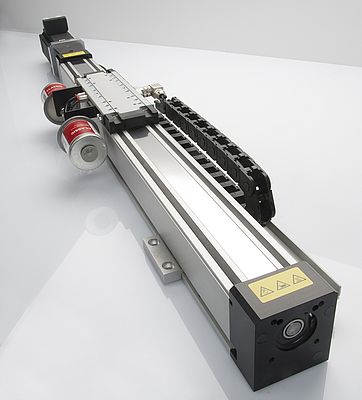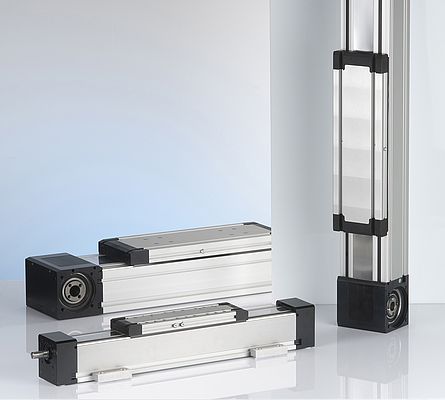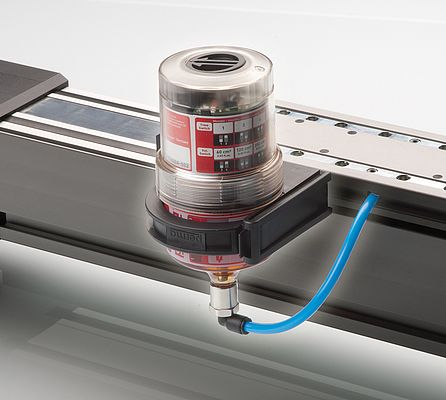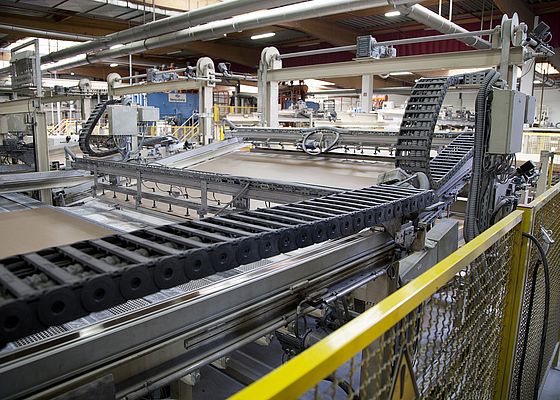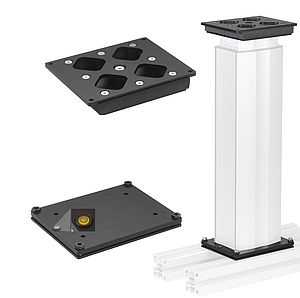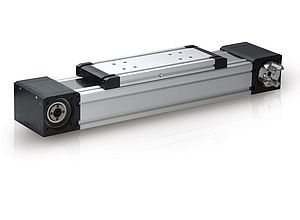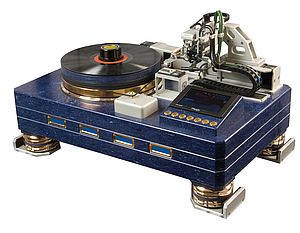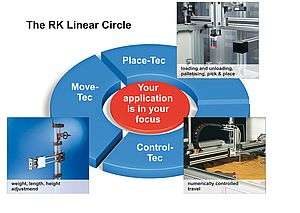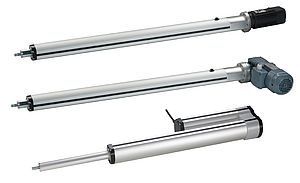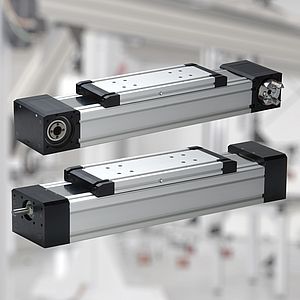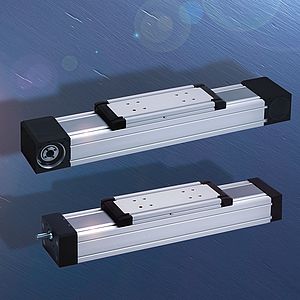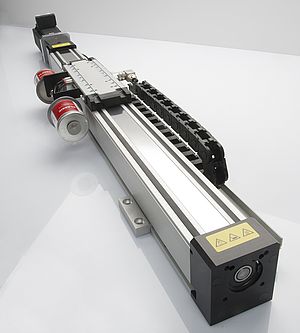Melamine dust is a huge problem in the manufacture of laminate flooring, which is why MeisterWerke Schulte GmbH uses specially protected linear units in its handling system for laminate production.
Rüthen-Meiste is a peaceful village in East Westphalia with a population of just 420. Once essentially agricultural in character, local life is now largely defined by a company in the timber-processing industry: with some 600 employees, MeisterWerke Schulte GmbH (MW) is larger than the village itself and is not only one of the region's key employers, but also one of Europe's most renowned manufacturers of wooden flooring, panels and accessories. In addition to a broad range of fine wooden flooring, the company's portfolio also includes high-quality laminates.
Automated handling system
The manufacture of this type of flooring involves decorative paper, an overlay containing melamine resin, a core board and a core layer being fused together at great pressure and high temperatures. The production process at MW uses a short-stroke press in three-shift operation. A handling system comprising suction grippers and linear units supplies the decorative paper to the press. The linear units ensure the horizontal movement of the traverse, which is fitted with the suction grippers. The decorative paper is transferred from the pallet by two guiding mechanisms. These mechanisms are mounted so that they are fixed on one side and height-adjustable on the other in order to enable precise adjustment to the angle of the product pallet. The other two linear actuators are fixed horizontally and route the removed paper elements onwards and place them on the conveyor belt.
Problematic dust exposure
The linear units are subject to above-average demands: a high number of cycles in continuous operation place maximum requirements on the devices. Additionally, the guide mechanisms are subject to extremely high levels of melamine dust produced from machining the laminate boards. Previous linear actuator models repeatedly broke down due to their extremely high exposure to this dust, incurring high repair costs and frequent downtimes in production. In their search for more robust units, the design engineers at MW took a closer look at the ball rail actuators of the Minden-based automation specialists, RK Rose+Krieger. "We were already familiar with Rose+Krieger as we use their Type E tubular linear units for the adjustment of sensors, nozzles and printer heads, etc. So we knew that the company offered quality, reliability and a price-performance ratio we could rely on," explained Edmund Luig, Head of Maintenance at MeisterWerke. He and his colleagues discovered that the third generation of the RK DuoLine Z 80 Protect offered a linear actuator more than capable of handling the high demands made on the laminate handling unit. These extremely easy to maintain and highly reliable ball rail actuators are characterised by short cycle times, high cycle rates and high repeatability - even in three-shift operation. An the cherry on the top: the RK DuoLine linear units from the Protect range are encapsulated with a stainless steel strip, which gives them an IP 40 protection rating and offers excellent protection against the melamine dust. "This dust is caused by abrasion and the cutting of the melamine boards. The adverse effects of this dust is that it blunts everything and brakes all motion," said Edmund Luig. The cover strip on the new linear actuators ensures smooth and frictionless travel under even the dustiest of conditions. Furthermore, magnetic strips fitted underneath the steel strip prevent overhead guides from sagging. "No other linear unit offered this feature," said Luig. The melamine dust did, however, initially cause a different problem for the RK DuoLine ball rail guides: integrated in the end cap of the guides is a felt wiper designed to "clean" the units during carriage travel. However, the large volumes of dust generated during continuous three-shift operation, and the resulting high friction, was forcing the wiper out of its cap. "Rose+Krieger solved the problem almost immediately by simply installing a wider piece of felt," said Luig.
Permanently lubricated
Another aspect of the RK axes which won favour with the MW design engineers was the travelling permanent lubrication - a special feature that considerably extends the lubrication intervals. The DuoLine linear units come equipped with screw-fit tapered lubrication nipples as standard. This feature enables lubrication in any carriage position and also helps to extend maintenance intervals compared to conventional guides. If permanent lubrication is required, as was the case with MW, the nipple is simply unscrewed and replaced with the travelling permanent grease lubrication system.
Modular design
MWS opted for RK DuoLine Z 80 Protect in the lengths 3091, 3291 and 4400 mm without drives. These were already available from the previous solution and could be combined with the new space-saving ball rail actuator without a problem. The required motor position does not need to be specified until actually setting up the linear actuators and can be changed quickly and easily if required. To facilitate this process, optional coupling adapters are also available, which can be affixed to all four outputs of the idler unit. This simplifies positioning, dispenses with the need for expensive modifications in the event that an incorrect motor outlet direction is ordered and reduces replacement costs for spare parts. The compact design of the guide is largely due to the fact that the coupling is partially integrated in the pulley box. The third generation of the RK DuoLine also has a low geometric moment of inertia, which makes it even more dynamic and able to achieve higher cycle rates than comparable models. This is also aided by the timing belt made of durable and resilient neoprene. Key features of this low-maintenance material are its smooth running and high precision even when subjected to high dynamic loads. The traverses with the suction grippers are screwed to the carriages via slot stones. The carriages themselves are mounted by MWS via laterally arranged BLOCAN® profile slots and clamping brackets. "This was all carried out quickly and with a minimum amount of engineering," remembered Edmund Luig. Furthermore, the profile slots enable maximum flexibility for the addition of customer-specific accessories, such as drag chains and tube holders, as well as limit or proximity switches for limit switching. The required slot stones can also be retrofitted in the profile slots. "The modular system underpinning our linear technology has one huge advantage for our customers in that it enables them to choose exactly what they want to install and only pay for the options they actually require for their application," said Jörg Bargheer, product manager for linear technology at RK Rose+Krieger.
This was also the case with the laminate specialists from Meisterwerke Schulte. They are now such staunch proponents of RK linear guides that they have included the system in their technical specifications. "All manufacturers commissioned by MWS to produce machinery must - where applicable - use our linear units," said Jörg Bargheer.


